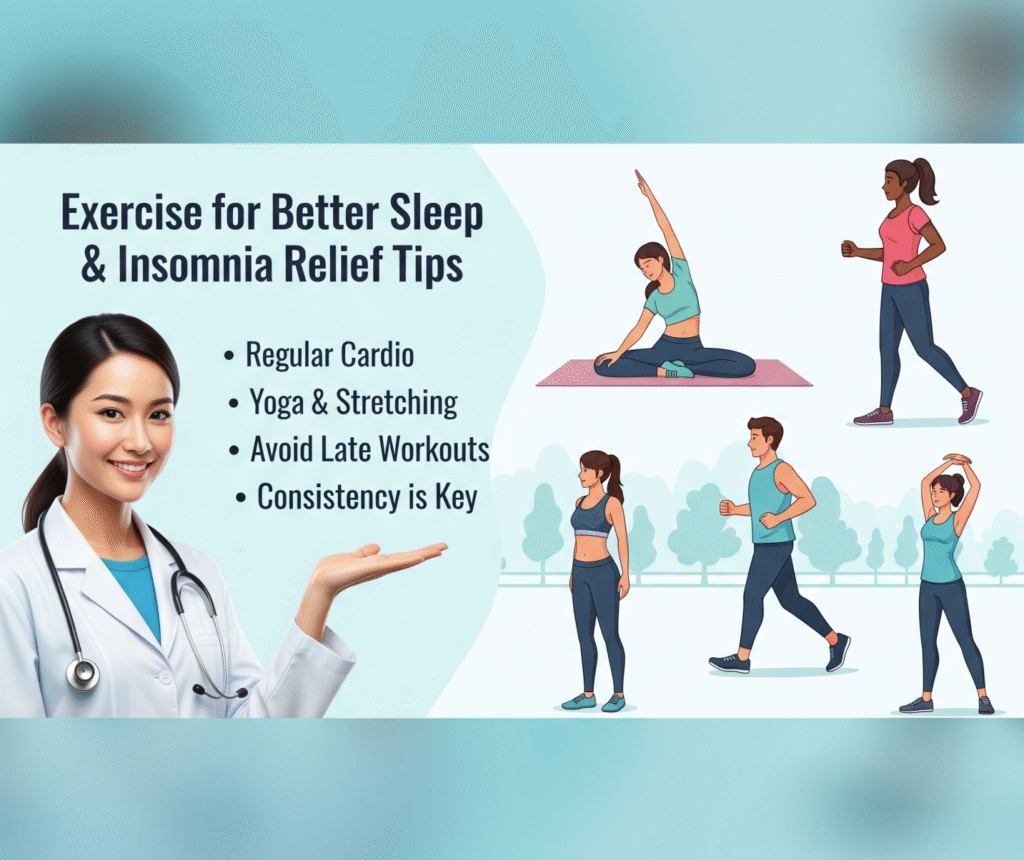
🧘♀️ Exercise for Better Sleep & Insomnia Relief: What Science Says
Struggling with sleepless nights or chronic insomnia? You’re not alone. Insomnia affects millions worldwide, impacting not just sleep quality but overall health. Fortunately, a new scientific review brings promising news—regular exercise, especially yoga and Tai Chi, can significantly improve sleep.
🌙 How Exercise Helps You Sleep Better
A recent meta-analysis of 22 randomized controlled trials (RCTs) explored the impact of physical activity on individuals with insomnia. Researchers found that mind-body exercises such as yoga, Tai Chi, walking, and jogging offer notable improvements in sleep quality, sleep duration, and sleep efficiency.
Let’s break it down:
- Yoga: This ancient practice emerged as the most effective in promoting relaxation and enhancing sleep. Its combination of gentle stretches, controlled breathing, and meditative focus appears to calm the nervous system and regulate the body’s sleep-wake cycle.
- Tai Chi: Known for its slow, flowing movements, Tai Chi showed the most sustained sleep benefits over time. It promotes mindfulness, lowers cortisol (stress hormone) levels, and improves mood—key factors in managing insomnia.
- Walking & Jogging: These aerobic exercises also helped participants fall asleep faster and experience fewer nighttime awakenings. Regular cardiovascular activity helps balance melatonin production and reduces anxiety, both linked to improved sleep.
🧠 Why It Works: The Science Behind It
Insomnia often results from hyperarousal of the brain and body. Physical activity counters this by:
- Reducing stress hormones like cortisol
- Increasing endorphins, which enhance mood and promote calmness
- Improving body temperature regulation, which aids in initiating sleep
- Synchronizing the circadian rhythm, making it easier to fall asleep at night
⏰ Best Time to Exercise for Better Sleep
While any time is better than none, exercising in the morning or early evening is generally recommended. Late-night intense workouts may be too stimulating for some people and can delay sleep.
✅ Practical Tips to Start
- Aim for at least 30 minutes of moderate activity, 5 days a week.
- Try evening yoga or gentle stretching if you struggle with restlessness.
- Combine physical activity with other healthy habits like reducing screen time before bed and following a consistent sleep schedule.
Final Thoughts
Whether you prefer a brisk walk or a calming yoga session, exercise is a natural, drug-free remedy for insomnia. If you’re looking for a sustainable way to sleep better, moving your body might be the key to resting your mind.
📚 Sources / Scientific References:
- Tang W, et al. “Effects of physical exercise on insomnia: A systematic review and meta-analysis.” Sleep Medicine Reviews, 2024. [DOI:10.1016/j.smrv.2023.101837]
- Zhou E, et al. “Tai Chi for sleep quality in adults with insomnia: A systematic review and meta-analysis of randomized controlled trials.” Complementary Therapies in Clinical Practice, 2023.
- Harvard Health Publishing. “Exercising for better sleep.” Harvard Medical School. https://www.health.harvard.edu
- American Academy of Sleep Medicine (AASM) – Physical Activity and Sleep. https://aasm.org